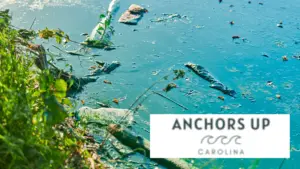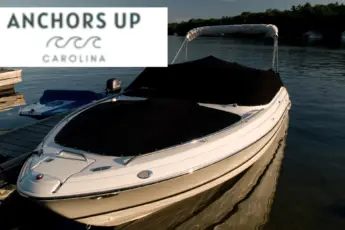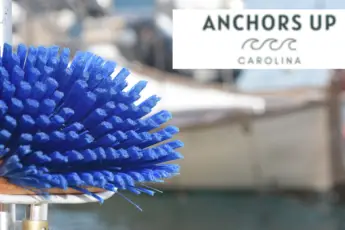Without a doubt, as boaters, we should be conscious of protecting our waterways. It is imperative to take measures to avoid polluting one of our most valuable resources. As a captain, I have traveled the open ocean frequently and have witnessed an abundance of trash floating at the surface. Here are 8 clean boating tips to keep in mind while you’re out on the water.
Bag Your Trash
It drives me crazy watching people toss trash into the water while boating. Additionally, boaters regularly have garbage go over the side and into the water while running at high speeds.
One of the best ways to prevent trash from ending up in the water is to bag it as soon as you’re done with it. Allowing chip bags, wrappers, cans, water bottles, and other items to sit in cup holders or on seats further increases the likelihood they will blow out of the boat.
For this reason, it is essential to have a trash bag on hand. Tie the trash bag to a stainless steel grab bar so everyone aboard the boat can use it when needed.
Use Eco-Friendly Boat Cleaning Products
When you’re performing a washdown of your boat, a clean boating tip is to use environmentally safe cleaning products.
Without a doubt, there are plenty of options when it comes to soaps. As a captain, I used a lot of soap to scrub away dirt, salt, and grim. Remember, all of that soapy water ends up in the body of water that you’re secured to the dock at.
One of the best products on the market is Star Brite. Star Brite offers a multitude of eco-friendly boat cleaning products.
Avoid Fuel Spills
For the most part, it is illegal to fill a boat with gasoline at the dock via a jug. Instead, vessels in the water must be refueled at the fuel dock.
Fuel spills occur for a multitude of reasons. First, ensure that the fill nozzle is positioned properly in the fuel fill receptacle.
Secondly, listen while the tank is being filled. When you hear the gas or diesel reaching the top, stop before it overflows. Without a doubt, the fuel will spill into the water if you’re not using oil-absorbing pads around the nozzle.
Lastly, never press the tank to full before allowing the boat to sit for extended periods of time. The combination of the sun and heat will cause the gas to expand and can pour out of the ventilation tubes or fill the receptacle.
Perform Routine Maintenance
Similar to a car, boat motors are subject to fluid leaks. Failure to perform routine maintenance is a factor in further increasing the likelihood of an oil or fuel leak. However, most steering systems are run by hydraulics. Therefore, you’re also at risk for hydraulic fluid leaks.
One of the best preventative measures is to inspect the steering line fittings and the motor. Additionally, bring the boat into the shop for annual maintenance, which includes oil changes, fuel filter changes, and hydraulic fluid changes.
Anchor Wisley
The bottoms of lakes, rivers, oceans, and coastal waters is home to many marine species. The species are a variation between plants, fish, crabs, coral, and invertebrates.
Anchoring on seagrass and reefs without question is detrimental to the ecosystem. Coral reefs become severely injured by anchors, causing portions of it to die off. When possible, locate a sandy area adjacent to the reef to drop the anchor.
Furthermore, if you’re in an area with an abundance of seagrass, avoid dropping the hook. Again, find a sandy location to deploy the anchor.
Limit Water Use
As a captain, I used a lot of water, especially when washing yachts. A yacht measuring 172 feet in length takes nearly eight hours to was from top to bottom. With a hose running continuously, that’s a significant amount of fresh water. However, I didn’t have much of an option; the salt needed to be rinsed away.
Whenever possible, limit the amount of water used to clean vessels. One of the best ways to prevent wasting access water is to use a nozzle at the end of the hose. All too often at marinas, I see people allowing a hose to run freely during the entire washdown. Do your best to avoid this; keep a nozzle on hand.
Use These 6 Clean Boating Tips
The next time you’re out on the water, utilize these 6 clean boating tips. It is imperative to keep our waters clean for future generations of boaters. These tips are easy to follow and will make a difference in protecting lakes, rivers, oceans, and coastal waterways.







